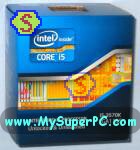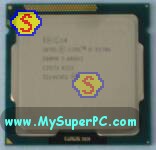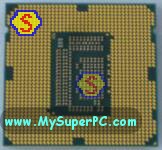Processor
Both Intel and AMD processors are an excellent choice. Market conditions and technology fluctuate, so the better bang-for-the-buck can change frequently. But both makers are well-regarded for their quality. I have the Intel Core i5 3570k quad-core dual-core processor in My Super PC.
|
Click on any picture to see it enlarged
|

|
I purchased the retail box version of the Intel Core i5 processor. The retail box includes a CPU cooler. You can see the processor itself in the window on the side of the box. This processor is a socket type LGA 1155.
|

|
Intel Core i5 3570k quad-core processor viewed from above.
|

|
Intel Core i5 3570k quad-core processor view from below.
|
A processor type is identified by its "socket type". There are a number of socket types available made by both AMD and Intel, so it's important to know the best one for building your own computer. Some socket types may be on their way to being discontinued, others may be too new to try, and others may be best suited for purposes other than desktop computers. Similarly, some models within a socket type are better choices for a desktop computer than others.
A single processor can have more than one core, the core being the part of the component that does the actual processing. A processor with 2 cores is called a dual-core processor, with 3 cores is called a triple-core processor, and with 4 cores is called a quad-core processor. More cores translate to more cost, but not always greater performance for two reasons. First, it's not uncommon for each individual core in a quad-core processor to run at a slower speed than the cores in a dual-core processor in the same price range. Second, most applications do not use the extra cores in a multi-core processor effectively, so the extra performance is unrealized. Another consideration is that 4 cores are likely to run hotter and require more cooling than 2 cores. In practical terms, this can mean a higher speed fan for the CPU cooler for a quad-core processor, resulting in a little more noise.
Something to be aware of is that a processor line is usually designated with a codename, such as Kentsfield, Toliman, Windsor, Brisbane, Wolfdale, Conroe, and many more. The codename is a name used internally by the maker (Intel or AMD) which always makes its way into use by the computer community. The codename identfies certain physical characteristics in the manufacture of the processor models in the processor line, such as the transistor density, the power requirements, the amount of cache it has, and so on. Keep in mind these are just example characteristics and the actual characteristics differentiating a processor line could be different. While those with their geek on will find these differences of interest, at the user level they often are not significant. For example, a processor which needs less power will probably generate less heat and therefore require less cooling, but practically speaking it won't make any difference in the CPU cooling solution at all. Two identical processor models can be produced under different processor lines (i.e., using different manufacturing processses). While they functionally should behave similarly, their cost may be significantly different depending on where each processor line is in its life-cycle.
It's worth noting that the days of "Moore's Law" are unfortunately over. This "law" was an observation or prediction made by Gordon Moore of Intel in 1965 that processor speeds would double every 18 months. The prediction held true for nearly 40 years, but if it were still true then 20GHz processors would be commonplace today. In the future, the emphasis will be on concurrency (parallel processing) to achieve performance gains. Multiple processor systems and multi-core processors are steps in this direction, but without software designed to take advantage of it they provide little gain. Yet parallel software design is far more complex than the serial software design of today, so don't expect any drastic changes in the near future. It may be some bittersweet solace that the processor you buy today actually won't become an outdated slowpoke as quickly as its predecessors became.
Retail Versus OEM Processors
There is no difference between the retail version of a processor and the OEM version of a processor. The retail version will come with a CPU cooler (a heat sink and fan combination) used to keep the processor from overheating. The CPU cooler that comes in the retail package will do the job just fine, and it's sure to be compatible with the processor in which it is packaged. The processor I have in My Super PC today was purchased in the retail package as pictured above.
The OEM version of a processor does not come in a retail box, but comes as just the processor alone, usually wrapped in bubble wrap. I've used OEM processors in a number of computers. Unlike the retail box, an OEM processor does not come with a CPU cooler. Purchasing a CPU cooler separately allows you to have something that cools better and performs more quietly than the CPU cooler that comes in the retail package. Be sure and use one that supports the socket type of the processor. I've written up my CPU cooler experiences at Build A Computer Like My Super PC - CPU Cooler And Case Fans.
The OEM version of the processor is often cheaper and may cover the difference in buying the CPU cooler separately. The OEM version is typically warranted for a much shorter period of time, often 30 days. But the consensus opinion is that even only one month is plenty of time to know if the processor is good or not. If it's going to fail then it will fail soon after it is used. In addition, many people tinker around with overclocking the processor. If the processor has to be modified, which is often the case, then that voids the warranty anyway. By the way, overclocking the processor is a whole subject in itself. The short answer on overclocking is "Don't bother", but for the longer answer see Build A Computer Like My Super PC - Overclocking.
One danger with buying an OEM processor is that it's not a shrink-wrapped package. So maybe some nefarious someone has already checked out the processor in some way and determined something negative about it - like it doesn't overclock well or doesn't even work! Guys who deal in processors for a living can tell something about it just by looking at all those tiny numbers etched on the top of it. And plenty of those selling OEM processors handle them carelessly, bouncing them around with no protection in a plastic tray like candy in a candy dish, flipping through them with their bare fingers - haven't they heard about ESD (electrostatic discharge) - grounding - wrist straps - "Hello-o". So be sure you want to take extra care to buy your OEM Athlon processor from a trustworthy source like the one I recommend at Build A Computer Like My Super PC - Cost To Build A Computer - Processor.
Here is an example of how an OEM processor might be packaged. This is an Athlon 64 3400+ processor I used in a previous version of My Super PC. This packaging is typical.Bubble-wrap around the processor sealed inside it's antistatic bag.
Best Processor Models
Both AMD and Intel make high-quality processors. Given that, it comes down to price for peformance. But performance can be difficult to compare, primarily due to how well all of the cores in the processor will be used. If the computer is going to be used heavily with an application that makes good use of multiple cores then it can make more sense to lean toward a quad-core processor. But I would not assume that quad-core is better in the "long term" thinking that applications will change to use multiple-cores effectively - there's no sign of such a trend.
Speaking to price is not straight-forward. For one thing, prices fluctuate and trend downward over time, so it's difficult to make any longstanding statement. For another, the acceptable cost for the processor may be as it fits within the total budget for the computer. Or it may have its own allocated price point.
While processors don't really have much in the way of distinguishing features (aside from the number of cores), advanced computer builders may consider how well a processor overclocks (how much faster it can be made to run beyond its stated specification). Since I'm not an overclocker, I don't place any weight on this characteristic.
A processor model designated as "Black Edition" indicates a model with its clock multiplier unlocked, which is something overclockers will appreciate but can be ignored by non-overclockers.
The choice largely comes down to current market price fluctuations and your budget. Be aware that the processor and motherboard must be of the same socket type, and the CPU cooler must be compatible with the socket type of the processor. Otherwise, for these two makes of processors, all of the other components in the computer are compatible with either one.





